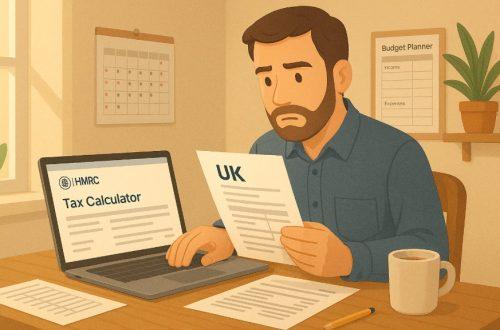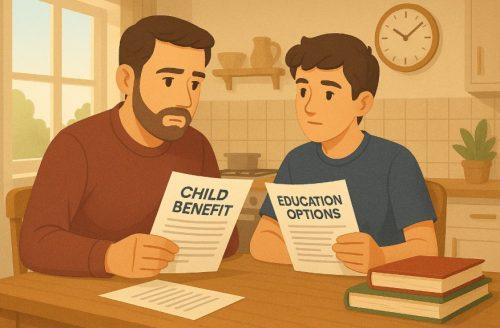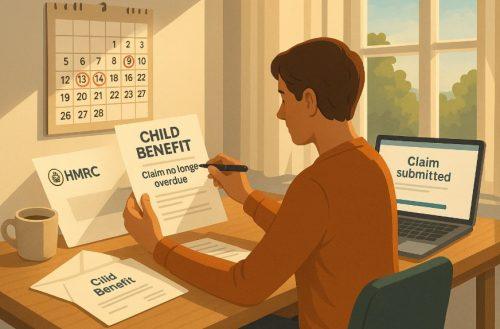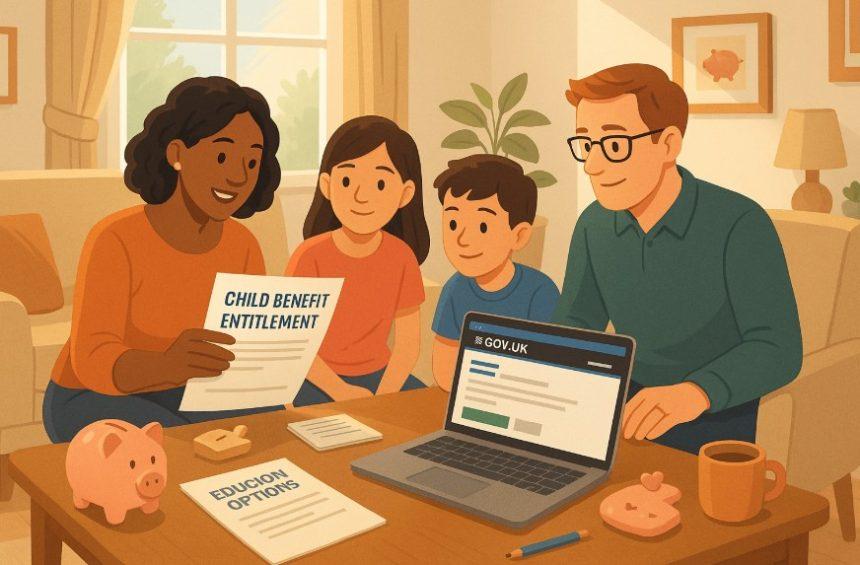Are you wondering what child benefits am I entitled to in the UK? You’re not alone. Many parents and guardians across the country are unsure about which support they’re eligible for, how much they can receive, or how to apply.
Whether you’re a new parent, a carer, or someone navigating a change in family circumstances, understanding the benefits available to you can significantly ease the cost of raising children. From regular Child Benefit payments to National Insurance credits, the system offers various forms of financial and practical help.
This guide breaks down everything in simple, straightforward terms so you can confidently determine your entitlement. With official guidelines, current 2025 rates, and answers to your most common questions, you’re in the right place to make informed decisions.
Let’s start by understanding exactly what Child Benefit is and who can claim it.
What Is Child Benefit in the UK?

Child Benefit is a tax-free payment provided to individuals responsible for raising children in the UK. This support aims to assist with the general costs of raising a child and is typically paid every four weeks. If you’re a parent, guardian, or even a foster carer, you could be eligible.
To claim Child Benefit, you must be responsible for a child under 16 or under 20 if they are in approved education or training.
You don’t need to be biologically related to the child, but you must either live with them or provide financial support that equals at least the value of Child Benefit. Only one person can claim Child Benefit for a child at any given time.
Key eligibility requirements:
- The child must live with you, or you must be financially responsible for them.
- You must live in the UK.
- Your immigration status must allow you to claim public funds.
You can also receive Child Benefit if you’ve adopted or are fostering, provided your local council is not paying for the child’s accommodation or upkeep.
It’s important to know that if your child goes into care or custody for more than eight weeks, this may affect your eligibility. Similarly, your child must not be receiving certain other benefits like Universal Credit or Jobseeker’s Allowance.
The final takeaway here is simple: if you’re responsible for a child who lives with you or is financially supported by you, and you meet the residency rules, you’re likely entitled to claim.
How Much Child Benefit Can You Get in 2025?
If you’re eligible, you’ll want to know exactly how much you can receive. Child Benefit payments are fixed and reviewed annually. For 2025, the rates have been updated to better reflect current living costs, making it more relevant than ever to stay informed.
Breakdown of rates for the first child and additional children:
The rate for your eldest or only child is higher than for any subsequent children. These are weekly payments.
- Eldest or only child: £26.05 per week
- Additional children: £17.25 per week, per child
Extra considerations:
These rates apply whether you’re working, unemployed, or receiving other forms of support. If you’ve adopted or fostered children, you’re still entitled to the same rates.
However, if your local authority covers a child’s costs, you may not qualify. In blended families, you and your partner can claim for different children, but you cannot both receive the higher rate.
The payment is usually made every four weeks, but if you are a single parent or on certain benefits, you can request weekly payments. Make sure to keep your family circumstances updated, as changes may affect the amount you receive or who is eligible to claim.
How Does Your Income Affect Child Benefit Entitlement?

While Child Benefit is available to all qualifying parents regardless of employment status, your income level could influence how much you effectively receive, especially if you or your partner earns more than the high-income threshold.
Once either partner’s income surpasses £50,000 per year, the High Income Child Benefit Charge (HICBC) comes into play. This charge is a form of tax repayment on the Child Benefit received.
Important points:
- If your income is over £50,000, you must pay back part of the Child Benefit through a tax return.
- If your income exceeds £60,000, the charge equals the full amount of the benefit received.
You can still claim the benefit and choose not to receive payments to avoid the tax charge. Doing so still entitles you to National Insurance credits, which count towards your State Pension and ensure your child gets a National Insurance number automatically at 16.
If both partners have high incomes, only the one with the higher income is responsible for paying the charge. You’ll need to fill out a Self Assessment tax return annually to manage this.
Ultimately, high earners should consider whether claiming payments is worth the added tax responsibility, but it’s generally advised to still submit a claim to secure other long-term benefits.
Can You Claim Child Benefit if You’re on Universal Credit?
Yes, you can receive Child Benefit while also receiving Universal Credit. These two benefits are separate and do not directly affect each other. However, the overall household income, including Child Benefit, may influence your total benefits if the benefit cap applies.
Universal Credit already includes support for children under its own system, known as the child element, but this doesn’t replace or reduce your right to claim Child Benefit.
A few things to keep in mind:
- Child Benefit is paid in addition to Universal Credit.
- It will not be deducted from your Universal Credit payment.
- If you’re subject to the benefit cap, your total benefit income may be reduced, but not the Child Benefit portion.
Even if you’re receiving other benefits, Child Benefit is usually still paid in full. As a single parent, you may also request that your Child Benefit to be paid weekly, giving you more flexibility with cash flow. This combination of Universal Credit and Child Benefit can provide essential support to households facing financial pressure.
When Does Child Benefit Stop and Can It Be Extended?

Child Benefit does not last forever, but it can be extended in specific situations. Understanding when payments end helps you plan financially and avoid unexpected loss of income.
Typically, Child Benefit stops on the 31st of August after your child turns 16. However, you can continue to receive payments until they’re 20 if they remain in approved education or training. This includes A-levels, NVQs up to level 3, and certain unpaid training schemes.
Situations where benefit may continue:
- Your child is enrolled in full-time non-advanced education.
- Your child is in a government-backed training programme.
- A 16-17 year old has registered with an approved careers service after leaving school.
If your child begins paid work for more than 24 hours per week or starts receiving benefits in their own right, payments will stop. Similarly, apprenticeships where the child is paid count as employment and end entitlement.
To ensure a smooth transition, update the Child Benefit Office with your child’s education or training status. This can prevent overpayments and help secure any backdated benefits you may still qualify for.
What Happens if You Don’t Claim Child Benefit?
Not claiming Child Benefit doesn’t just mean missing out on regular payments. There are other long-term consequences, especially relating to your State Pension.
One of the most overlooked benefits is the National Insurance credits that come with claiming Child Benefit. If you are not working or earning below the National Insurance threshold, these credits help protect your State Pension entitlement by filling in contribution gaps. Even if you choose not to receive the payment due to the High Income Child Benefit Charge, you should still make a formal claim.
This way:
- You get National Insurance credits.
- Your child receives an automatic National Insurance number at 16.
- You can opt back into payments if your income drops in the future.
Failing to claim can result in pension gaps or require you to pay voluntary contributions later. If someone else, like a grandparent, provides care, they may be eligible for Specified Adult Childcare credits, which further protect the family’s future entitlements.
Always submit a claim to safeguard these non-financial but highly valuable advantages.
How Do You Apply for Child Benefit in the UK?

Applying for Child Benefit is a straightforward process, but being prepared helps ensure no delays. The earlier you apply after your child is born or comes into your care, the sooner you can start receiving payments.
You can apply using a CH2 form, which can be sent by post or completed online through your HMRC account.
Step-by-step Claim Process
- Download or request the CH2 claim form.
- Complete it with accurate information about yourself and your child.
- Send it to the Child Benefit Office by post or complete the digital form online.
Required Documents and Forms
- Birth or adoption certificate of your child
- Proof of address and immigration status (if applicable)
- Bank details for payment
If you are adopting or fostering, you’ll need documentation that shows the child is officially in your care.
How Long Does It Take to Receive Payment?
- Claims are usually processed within 12 weeks
- Backdated payments may apply for up to 3 months
- Payments are typically made every 4 weeks, or weekly for single parents or those on qualifying benefits
To avoid delays, make sure all sections of the form are filled and signed properly. You can also contact the Child Benefit Office if you have any questions during the process.
What Child Benefit Options Exist for Non-UK Residents?
Non-UK residents may still qualify for Child Benefit, depending on their immigration status and right to reside. The UK has clear criteria for those moving into the country or those with temporary residency. You must have a legal immigration status that allows you to access public funds.
This includes:
- British or Irish citizenship
- Settled or pre-settled status under the EU Settlement Scheme
- Refugee or humanitarian protection
- Indefinite leave to remain
You may also qualify if you are a family member (child, parent, grandparent) of someone with a qualifying status. However, if you’ve applied to the EU Settlement Scheme and are waiting for a decision, you must also prove a right to reside.
Claimants living abroad typically don’t qualify unless they are Crown servants or meet other special conditions. It’s essential to check eligibility based on your immigration documents and employment history. For new arrivals, you may need to meet a “3-month UK living requirement” before receiving your first payment.
Can You Backdate a Child Benefit Claim?

Yes, Child Benefit claims can be backdated, but only up to a maximum of 3 months from the date HMRC receives your application. This is particularly helpful for new parents who may not apply immediately after birth or adoption. To ensure you receive the full amount you’re entitled to, it’s recommended to submit your application as soon as possible.
Common reasons for backdating:
- Delay in receiving your child’s birth certificate
- New foster or adoption arrangements
- Not aware of eligibility at the time
To request backdated payments, simply include a request on your CH2 form when applying or mention it during your online claim. HMRC will review your case and confirm the earliest eligible payment date.
While you cannot claim beyond three months, securing this back payment can provide valuable financial relief for families adjusting to their new responsibilities.
Conclusion
Knowing what child benefits you are entitled to in the UK helps you secure the support you and your family deserve. From regular payments and National Insurance credits to special considerations for non-UK residents or high-income earners, every situation has unique entitlements.
Whether you’re a new parent, part of a blended family, or managing financial changes, claiming Child Benefit ensures both financial relief and long-term advantages like pension credits and automatic National Insurance numbers for your child.
Remember to keep your information updated with HMRC and claim even if you choose not to receive payments. Take action today and explore your entitlement. It could make a meaningful difference in your child’s future.
FAQs
What documents do I need to claim Child Benefit?
You’ll need your child’s birth certificate, proof of address, and possibly immigration documents depending on your status.
Can I receive Child Benefit and Universal Credit at the same time?
Yes, Child Benefit is separate from Universal Credit and does not reduce your entitlement to it.
Do both parents need to apply for Child Benefit?
No, only one person can claim for each child. If you’re both eligible, decide who claims.
What if my income is over £60,000 a year?
You can still claim Child Benefit, but you may need to repay it through the High Income Child Benefit Charge.
Can I stop and restart Child Benefit payments?
Yes, you can opt out of payments and restart them later by informing HMRC of your decision.
Will my child automatically get a National Insurance number?
Yes, if you claim Child Benefit, your child will usually receive an NI number just before they turn 16.
Is Child Benefit taxable?
No, it’s not taxable income, but high earners may pay a tax charge related to it.








